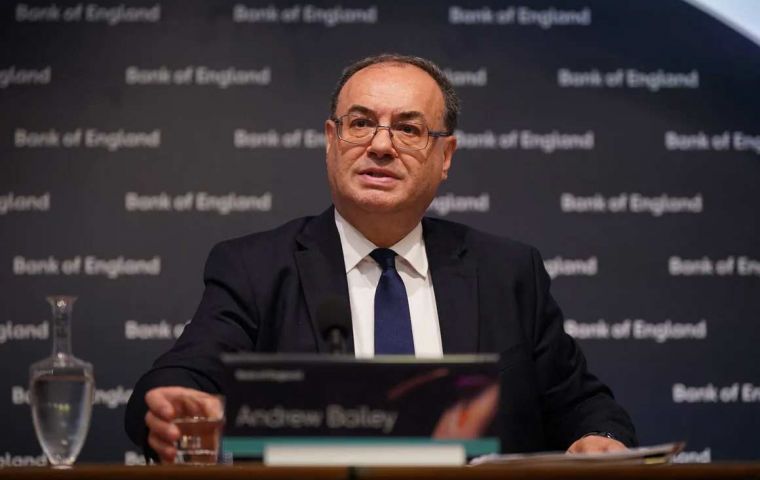MercoPress. South Atlantic News Agency
Bank of England rate up to 5,25%, highest in fifteen years; no prospects of abating
 Bank of England chairman Andre Bailey for the first time admitted that “more evidence is needed inflation was falling before cutting rates”.
Bank of England chairman Andre Bailey for the first time admitted that “more evidence is needed inflation was falling before cutting rates”. The Bank of England raised on Thursday its main interest rate to 5.25%, the highest in 15 years, as the country strives to control persistently high inflation. The quarter percentage point hike was the bank's 14th in a row.
Policymakers “will continue to monitor closely indications of persistent inflationary pressures,” the bank said in a statement following a regular meeting. Both Sterling and British government bond yields slightly dropped, while stocks rose.
“If we stick to the plan, the bank forecasts inflation will be below three percent in a year's time without the economy falling into a recession,” said Finance Minister Jeremy Hunt, in a statement after the latest hike.
“But that doesn't mean it's easy for families facing higher mortgage bills so we will continue to do what we can to help households.”
Bank of England chairman Andre Bailey for the first time admitted that interest rates would stay higher for longer in an effort to battle soaring price rises and “more evidence is needed inflation was falling before cutting rates”.
The Bank has not spelled out how long rates will remain high, however some economists, such as Capital Economics, have predicted that interest rates would rise again in September to peak at 5.5% and will stay that way for a year.
The United Kingdom has been suffering from a cost of living crisis, exacerbated by the two-year pandemic intermittent lockdowns, which were closely followed by the economic aftermath of Russia's invasion of Ukraine. Brexit, the kingdom's exit from the European Union has also had an impact.
Last month, inflation fell more than projected to 7.9%, easing the pressure to introduce a more aggressive interest rate hike.
The Bank of England, alongside the US Federal Reserve and the European Bank, have been adopting a policy of consistently hiking interest rates for over a year, in an effort to abate inflation, by make it more expensive for consumers and businesses to borrow for purchase.
Interest rates in the UK and most developed economies have been at or close to record lows ever since the global financial crisis of 2008.
Most central banks slashed rates, often all the way to zero, in response to the economic upheaval, trying to spur a recovery and a return of modest levels of inflation. As this process proved extremely slow, the rates stayed in previously uncharted territory for years.
However, a combination of the aftermath of the COVID pandemic and Russia's invasion of Ukraine caused a rapid rise in inflation that began in late 2021 and carried forward into the middle of 2022 — forcing a number of central banks to raise their rates again. Most, including the UK's, now sit roughly where they did prior to the 2008 financial crisis.




Top Comments
Disclaimer & comment rulesCommenting for this story is now closed.
If you have a Facebook account, become a fan and comment on our Facebook Page!